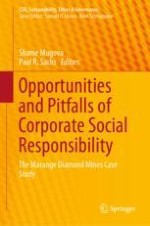2019 | OriginalPaper | Buchkapitel
The Socio-economic Impact of Corporate Social Responsibility on the Zimbabwe Mining Industry
verfasst von : John Davison Gondwe Nhavira
Erschienen in: Opportunities and Pitfalls of Corporate Social Responsibility
Aktivieren Sie unsere intelligente Suche, um passende Fachinhalte oder Patente zu finden.
Wählen Sie Textabschnitte aus um mit Künstlicher Intelligenz passenden Patente zu finden. powered by
Markieren Sie Textabschnitte, um KI-gestützt weitere passende Inhalte zu finden. powered by
